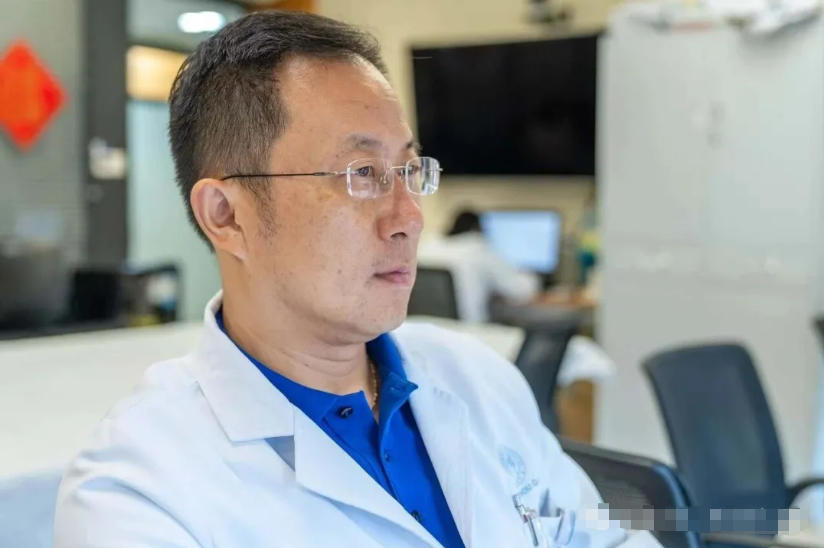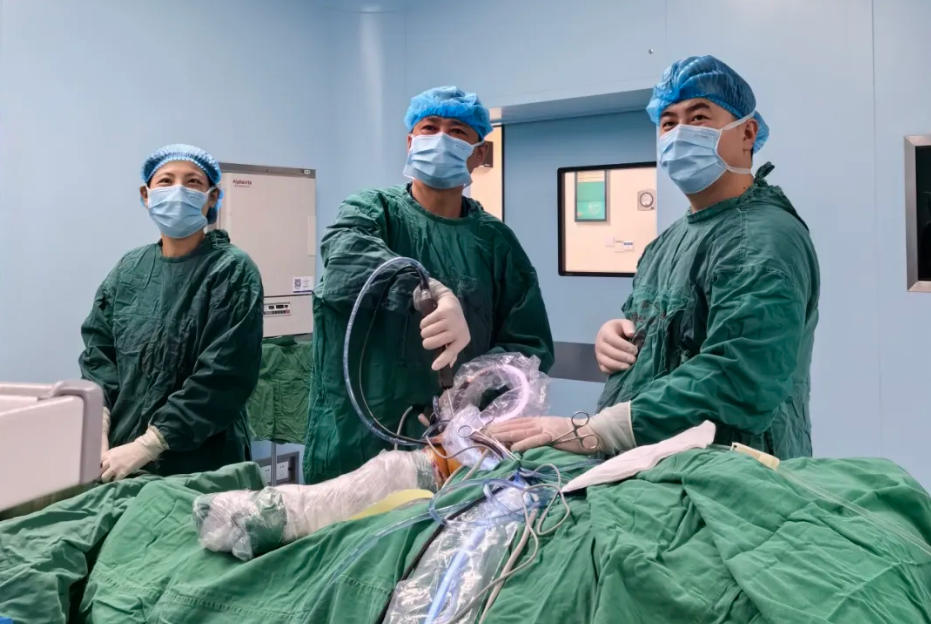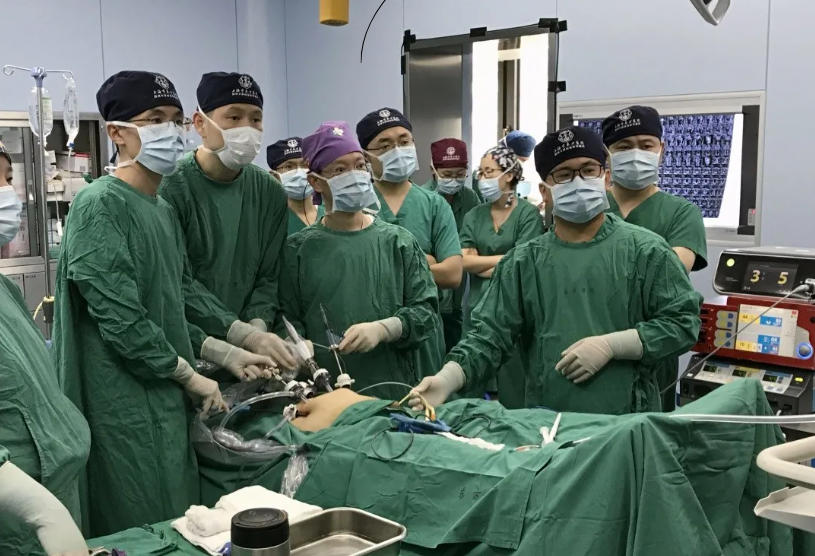Update time:2025-09-18Visits:1760

Liu Yingbin, Surgery, Professor, Director of Shanghai Cancer Institute, Director of the Department of Biliary - Pancreatic Surgery and Director of the Cancer Center at Renji Hospital
Introduction
He is a physician who views his profession as a mission, dedicating himself to it with unwavering commitment. His pursuit of medical advancement has been relentless. He combines expert medical knowledge and surgical skill with a sharp ability to identify scientific questions in clinical practice, integrate research with patient care, and translate scientific discoveries into tangible treatments. This dedication has brought hope to countless patients, reflecting his profound compassion.
A trailblazer in his field, he dares to challenge the most difficult surgical barriers. With great expertise, he has tackled gallbladder and pancreatic cancers—two of the most formidable diseases—transforming them from conditions with limited surgical options into ones that are operable. He has turned the impossible into possible, providing new solutions for medicine in China and across the globe. His philosophy is a balance of change and constancy: change drives innovation in concepts and technology, while constancy represents a physician’s enduring commitment to their core purpose.
In recent years, under his leadership, the Department of Hepatopancreatobiliary Surgery at Renji Hospital and the Shanghai Cancer Institute have integrated deeply, advancing medical exploration not only at Renji but throughout Shanghai.
The Path to Medicine
“I was often sick as a child, and healthcare resources were limited at the time. I remember the long, difficult journeys to see a doctor with my mother. To show her gratitude for their hard work, she would sometimes give the doctors a simple gift, like a can of food. That sincere gesture left a deep impression on me, instilling an early respect for the medical profession.”
After high school, Liu Yingbin chose to attend medical school, driven by a desire to help others.
“On my medical journey, I have been fortunate to have mentors who acted like lighthouses, guiding me in the right direction. Each one provided invaluable guidance.”
Liu’s first mentor was Dr. Li Qing. Dr. Li started as a medical worker in a small county and, through diligent study, became an exceptionally skilled and renowned physician. “His greatest influence on me was to treat every patient with equal respect, explain their conditions clearly, and provide effective treatment.”
Seeking to advance his skills, Liu pursued postgraduate studies at Jiangxi Medical College, where he met his supervisor, Professor Jiang Xiaoqiang, a surgeon with over 40 years of experience and extensive expertise.
“He is a very kind and humble person. When I faced challenges, he generously supported and encouraged me. His profound sense of responsibility to his family and patients, and his professional dedication, deeply influenced me. Remarkably, even at over 87, he remains full of vitality and passion for medicine.”
After graduating, Liu joined Zhejiang University, where he met his third mentor, Professor Peng Shuyou. Professor Peng is an honorary fellow of the surgical colleges of the United States, Britain, France, and Europe. He has been recognized as one of China’s top ten contemporary medical giants and a “People’s Doctor.” His inventions, including a multifunctional surgical dissector and a new “binding” pancreaticojejunostomy method, have won numerous national science and technology awards and were described by international experts as a revolutionary advance in surgery.
“He is a true master. Even in his 90s, he possesses an endless love for medicine, often participating in frontline clinical surgeries and guiding complex operations. During my doctoral studies, he provided me with significant academic guidance and inspiration.”
To Liu, each mentor has been a guiding force on his medical journey, and their teachings will stay with him for life. It is this legacy of mentorship that has shaped his successful career.
Pioneering Advances in Hepatopancreatic Care
“I learned a great deal from Professor Peng Shuyou.”
In December 1995, while treating a car accident victim with a fractured pancreas, Professor Peng Shuyou innovatively used a “binding” method to connect the pancreas and intestine, avoiding leakage from suture holes. This was the first use of “binding pancreaticojejunostomy” in China.
Since the world’s first pancreatic cancer resection in 1935, a safe and effective solution for pancreaticojejunal anastomotic leakage had remained elusive. Professor Peng replaced traditional suturing with a rope-binding technique, creatively solving a medical problem that had perplexed the international community for 70 years. At the time, I verified the method’s feasibility and mechanism through animal experiments. This suture-hole-free technique reduced the incidence of postoperative “pancreatic leakage” to 0.2%, making it one of the best anastomosis techniques available.
The method was adopted nationwide and even influenced international standards. Through relentless clinical practice, Liu Yingbin continuously learned and refined his skills, laying a solid foundation for his future career.
Due to his outstanding performance at the Second Affiliated Hospital of Zhejiang University, Liu was recruited to Shanghai to lead the Department of General Surgery at Xinhua Hospital. He guided the department through a leapfrog reform—a comprehensive expansion of its scope that aligned with global medical trends, rather than a simple organizational change.
Through this reform, Liu enhanced the department’s subspecialties, transforming a large but undifferentiated department into a system of specialized units. This spurred vigorous growth, with outpatient visits and surgical procedures increasing year after year. The department rapidly advanced in healthcare, teaching, and research, becoming one of the largest at Xinhua Hospital. Today, it is a ministerial-level key clinical department known for its standardized treatment of gastrointestinal tumors, complex hepatopancreatobiliary surgeries, and expertise in minimally invasive surgery.
The reformed department now includes five inpatient wards, a Shanghai research center, a university research institute, and a laboratory. These facilities provide strong support for doctors’ clinical and research work, fostering an environment where innovation thrives and new discoveries are quickly translated into patient care.
Clinically, Liu led his team in performing many groundbreaking surgeries, pioneering several abdominal procedures in Shanghai, including the city’s first single-port laparoscopic cholecystectomy and appendectomy. They also successfully performed the most difficult retroperitoneal tumor resection in Xinhua Hospital’s history, along with a series of other complex operations.
Additionally, Liu introduced new technologies like radiofrequency ablation for liver tumors and advanced laparoscopic and endoscopic techniques, achieving excellent results. The department has developed its own characteristic treatment systems in multiple fields, including personalized gastric cancer therapy, standardized treatment of malignant biliary tract tumors, and complex vascular surgery, consistently maintaining a leading position in China.
In 2013, under Liu’s leadership, Xinhua Hospital established the Biliary Disease Research Institute, followed by the Shanghai Biliary Disease Research Center in 2016. His team has undertaken numerous national-level research projects, secured multiple patents, and published many influential academic papers, maintaining a leading international position in biliary tract tumor research.
The leapfrog reform transformed the Department of General Surgery, elevating its professional standards and academic standing to national and international prominence.

A New Vision Realized at Renji Hospital
On June 1, 2020, Liu Yingbin became Director of the Department of Hepatopancreatobiliary Surgery at Renji Hospital and Director of the Shanghai Cancer Institute, marking another milestone in his career.
“I still remember arriving at Renji on Children’s Day. I had wanted to work here since I was a medical student because Renji is one of China’s oldest Western-style hospitals, with a 180-year history. Coming to Renji was a dream come true.”
Under Liu’s leadership, the department has progressed rapidly. “With the strong support of Professor Fang Jingyuan and Professor Ge Zhizheng from Gastroenterology, our surgeons and gastroenterologists established a dedicated ERCP team and opened a specialized ward. Today, our annual ERCP volume has grown significantly from 600 to 2,500 cases, ranking among the highest in Shanghai and nationwide.”
The ERCP ward primarily admits elective patients under 75 without severe comorbidities, as well as those with mild to moderate acute cholangitis or biliary pancreatitis. It also handles more complex cases, such as patients with post-transplant biliary complications or difficult-to-treat bile duct stones.
Elective patients are admitted and undergo surgery within a week, while emergency patients are admitted and operated on the same day. Patients are typically discharged in 2-3 days. This model has enhanced patient care, reduced costs, and conserved medical resources, achieving a goal of “dedicated team, immediate admission, rapid turnover” and alleviating the common problem of accessing timely care.
The department has also embraced the “diversification of minimally invasive surgeries and minimally invasive approaches to open surgeries.” They have successfully transformed traditional open procedures into minimally invasive ones, reducing trauma and accelerating recovery. They have developed unique methods for treating biliary tract tumors, which have been continuously refined.
The department’s research findings have been incorporated into medical textbooks at all levels, elevating clinical education and providing advanced continuing education for doctors.
Liu’s concept of “total mesopancreas excision for pancreatic head cancer” has brought curative surgery to patients previously deemed inoperable. His proposed treatment concepts for intrahepatic cholangiocarcinoma have fundamentally changed the traditional understanding of the disease. His surgical innovations in gallbladder and pancreatic cancer have filled multiple international gaps in treatment.
Liu believes clinical practice and research are inseparable. The integration of the Shanghai Cancer Institute and Renji Hospital has greatly advanced this translation of research into practice. “As physicians, we must broaden our horizons, extending our efforts from the operating table to the laboratory bench.”
In basic research, Liu was the first internationally to construct the somatic mutation spectrum of gallbladder cancer, revealing that mutations in the ErbB signaling pathway are a key driver. He showed these mutations promote immune escape by upregulating PD-L1, providing a basis for molecular classification and guiding targeted and immunotherapy.
“Gallbladder cancer is the most common biliary cancer, highly malignant and insensitive to conventional therapies. Surgery is the primary treatment, but the prognosis is often poor.”
His team’s study explored how different cell subpopulations in the tumor microenvironment regulate gallbladder cancer with ErbB mutations. Using single-cell and whole-genome sequencing, they found these mutations create an immunosuppressive environment. “Building on this, we transformed this mechanism into a database for clinical analysis.”
Under Liu’s leadership, China is at the forefront of research on ErbB mutations in gallbladder cancer. He established the largest multi-center clinical cohort database for the disease in China, supported by the government. “This database, created by our China Gallbladder Cancer Research Group, provides a reliable platform for research. We hope to develop it into an official resource to break down barriers between hospitals.”
These achievements are also a result of Liu’s two-decade-long focus on gallbladder tumors, despite challenges like sample acquisition. “We have persisted, combining clinical work with basic research, and have made many new discoveries.”
In recent years, Liu and his team have received numerous awards, including the First Prize of the Shanghai Natural Science Award, the First Prize of the Huaxia Medical Award, and the Wu Jieping-Paul Janssen Medical and Pharmaceutical Award. These honors affirm their outstanding contributions and inspire them to continue their pioneering work.

Bringing Medicine to the Community: A National Commitment
Liu Yingbin is not only an active participant in China’s national “Healthy China” initiative but also a practitioner who leads by example.
“We now share our expertise by establishing regional studios to serve local patients. We provide these services free of charge at the community level, and from my perspective, it is incredibly worthwhile.”
Liu’s studio has even been established in the Daxinganling region of Heilongjiang Province, a remote frontier area. This initiative brings expert medical care directly to patients in this vast forested region, offering tangible healthcare convenience to local residents.
Liu still remembers the studio’s first day, when he and his team worked late into the night, performing multiple complex surgeries. He handled cases such as severely impacted gallstones and complex anatomical variations in the bile duct. “Since traveling to Shanghai for care is incredibly difficult for these patients, we feel a duty to perform as many surgeries as we can and help as many people as possible locally.”
In Shanghai, Renji Hospital has formed a close healthcare partnership with Jiading District. Through this network, Liu’s team regularly travels to Jiading for outpatient consultations and surgeries. He also serves as the Director of the General Surgery Department at Jiading District Central Hospital.
“I’ll be in Jiading for surgery in a few days,” he said. “This model of cooperation allows our expertise to benefit local hospitals right here in Shanghai, which has a real, practical impact. It makes care more accessible, and that is precisely what our integrated partnership is all about.”
On Doctors’ Day in 2023, Liu’s team successfully performed a highly complex pancreaticoduodenectomy in Jiading—a procedure that previously required patients to be transferred to Renji’s main campus. Liu believes that as this partnership grows and Renji’s resources extend further into the community, more patients will be able to access high-quality medical services with greater convenience.
Under Professor Liu Yingbin’s leadership, the Department of Hepatopancreatobiliary Surgery at Renji Hospital has not only achieved remarkable clinical success but has also made groundbreaking research progress, providing new approaches to treating major diseases like gallbladder cancer. Looking ahead, Renji Hospital will continue to uphold its patient-centered philosophy, advance medical reforms, and foster innovation to bring health and hope to more patients. With Professor Liu and his dedicated team at the helm, Renji Hospital is poised for an even brighter future, establishing itself as a leading center of medical excellence in China and across the globe.
Editor: Chen Qing @ ShanghaiDoctor.cn
If you'd like to contact Doctor Liu, please be free to let us know at chenqing@ShanghaiDoctor.cn.
Note: Chinese Sources from “The Path of Benevolent Medicine” which was published in 2024. It records 90 important medical figures in the history of Renji Hospital. Yewen Renyi (ShanghaiDoctor.cn) team was one of the major writers of the book and is authorized by Renji hospital to create English version on the website of ShanghaiDoctor.cn
Hospital: Renji Hospital, Shanghai Jiao Tong University School of Medicine
Dr. Zhou Qianjun | “Sculpting Life in the Chest” – A Portrait” – A Portrait
Dr. Cai Junfeng | Guarding Bone and Joint Health, Improving Quality of Life
Dr. Xu Xiaosheng|The Gentle Resilience of a Male Gynecologist
Dr. Shi Hongyu | A Cardiologist with Precision and Compassion
Dr. Zhang Guiyun|The Inspiring Path of a Lifesaving Physician
Dr. Chen Bin | Building the Future of ENT Surgery at Lingang,Shanghai
Prof. Zhang Baigen | The Oral History of China’s Vascular Surgery

Dr. Zhou Qianjun | “Sculpting Life in the Chest” – A Portrait” – A Portrait

Dr. Cai Junfeng | Guarding Bone and Joint Health, Improving Quality of Life

Dr. Cui Xingang | The Medical Dream of a Shanghai Urologist

Dr. Xu Xiaosheng|The Gentle Resilience of a Male Gynecologist

Dr. Shi Hongyu | A Cardiologist with Precision and Compassion

Dr. Zhang Guiyun|The Inspiring Path of a Lifesaving Physician

Dr. Jiang Hong | Bringing Hope to Vascular Frontiers

Dr. Huang Jia | A Journey of Healing "Breath"

Dr. Chen Bin | Building the Future of ENT Surgery at Lingang,Shanghai

Prof. Zhang Baigen | The Oral History of China’s Vascular Surgery